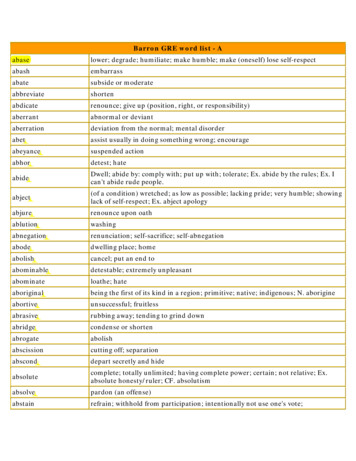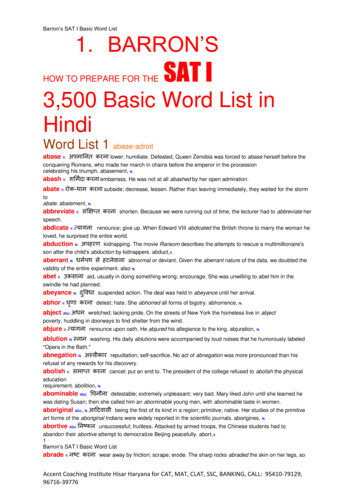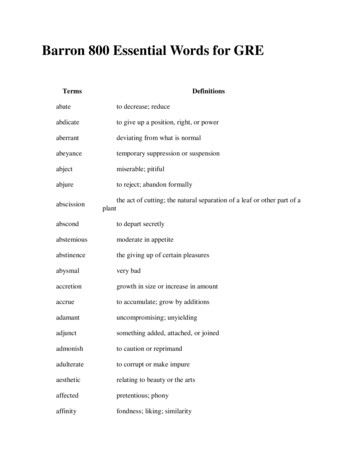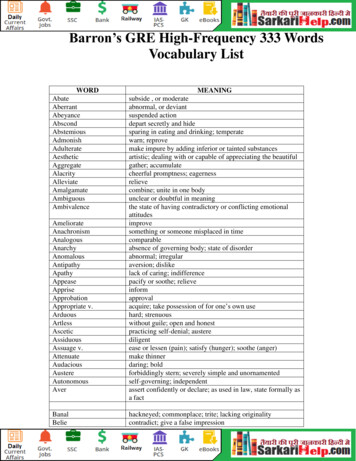
Transcription
7-9393-501GermVrbs-Fbs9/11/074:29 PMPage 1GERMANVERBS0BARRON’SGUFOREIGNL A N G UA G BAFORELANIGAGUGNEDGUIESLearning German Is Twice as Easy withThis Helpful 2-in-1 Combination!The easy-to-use reference book gives you:The bonus CD-ROM gives you: Sentence completion exercises—fill in the correct word Dialogue exercises—fill in the appropriate response Word completion exercises—find the correct verb form Word seek exercises—find the right word to fit the phrase Matching with English—find correct translations in theright-hand column Answers given for all exercisesISBN-13: 978-0-7641-9393-4ISBN-10: 0-7641-9393-7EANBRAND-NEWEDITION OFBARRON’SBEST-SELLING501 VERBSSERIES 16.99 Canada 19.99GERMAN VERBS The most common German verbs, alphabetically arranged, one verb per page,conjugated in all tenses Common idioms and example sentences demonstrating verb usage Index of German verb forms identified by their infinitive A summary of sequence of verb tenses . . . and much moreGERMANVERBS0FOURTH EDITIONFully conjugated in all the tensesin an easy-to-learn formatalphabetically arrangedHenry StrutzEE MRF ROECD SIDINwithTHE BEST-SELLING VERB SERIES IN THE WORLDw w w.b a r r o n se d u c.co mCD-ROM
7 9393 501German FM18/28/073:31 PMPage iS’NORRBAFORELANIGAGUGNEDEIUGGERMANVERBS0FOURTH EDITIONFully conjugated in all the tenses in a new,easy-to-learn format, alphabetically arrangedbyHenry StrutzFormerly Associate Professor of LanguagesS.U.N.Y., Agricultural and Technical CollegeAlfred, New YorkS
7 9393 501German FM18/28/073:31 PMPage ii Copyright 2008, 1998 by Barron’s Educational Series, Inc.Prior editions Copyright 1990, 1972 by Barron’s Educational Series, Inc.All rights reserved.No part of this book may be reproduced in anyform, by photostat, microfilm, xerography, or anyother means, or incorporated into any informationretrieval system, electronic or mechanical, withoutthe written permission of the copyright owner.All inquiries should be addressed to:Barron’s Educational Series, Inc.250 Wireless BoulevardHauppauge, New York 11788www.barronseduc.comISBN-13: 978-0-7641-9393-4ISBN-10: 0-7641-9393-7Library of Congress Catalog Card No. 2007011978Library of Congress Cataloging-in-Publication DataStrutz, Henry.501 German verbs : fully conjugated in all the tenses in a new, easy-to-learnformat, alphabetically arranged / by Henry Strutz. — 4th ed.p. cm. (Barron’s foreign language guides)Includes index.ISBN-13: 978-0-7641-9393-4 (alk. paper)ISBN-10: 0-7641-9393-7 (alk. paper)1. German language—Verb—Tables. I. Title. II. Title: Five hundred oneGerman verbs.PF3271.S855 2008438.2'421—dc22PRINTED IN CANADA9 8 7 6 5 4 3 2 12007011978
7 9393 501German FM18/28/073:31 PMPage iiiContentsForewordPronunciationTenses and Moods in German, with English EquivalentsSample English Verb ConjugationSample German Verb ConjugationSample English Verb Conjugation—Passive VoiceSample German Verb Conjugation—Passive VoiceWeak and Strong VerbsSpecial Verb UsesSome Pointers on the Use of TensesThe Subjunctive MoodVerbs with a Dative ObjectSubject Pronouns and Verb Forms in the Imperative MoodEssential 55 Verb ListAlphabetical Listing of 501 German Verbs Fully Conjugatedin All the TensesAppendixesPrefix VerbsWord OrderVerb Drills and Tests with Answers ExplainedWeather Expressions and Impersonal VerbsProverbs and Idiomatic ExpressionsEnglish-German Verb IndexGerman-English Verb IndexIndex of Verb Forms Identified by 7680686692
7 9393 501German FM18/28/073:31 PMPage ivForewordThe verb is a very important part of speech; it denotes action or state of being.The noted American historian and poet, Carl Sandburg, once declared that theCivil War was fought over a verb, namely, whether it was correct to say “TheUnited States is” or “The United States are.”For each of the 501 verbs listed in this book, the student will find the principalparts of each verb at the top of the page. The principal parts consist of:1.2.3.4.the Infinitivethe third person singular of the Past Tensethe Past Participle (preceded by ist for sein verbs)the third person singular of the Present TenseEXAMPLE:ENGLISH: to speak, spoke, spoken, speaksGERMAN: sprechen, sprach, gesprochen, sprichtThese are the basic forms of the verb and should be memorized, especially inthe case of the irregular or strong verbs, that is verbs which change the stemvowel of the Infinitive to form the Past Tense and whose Past Participle ends inen. More than one-half of the verbs in this book are strong or irregular verbs.Weak or regular verbs do not change the stem vowel of the Infinitive to formthe Past Tense but merely add the ending te (plus personal endings in the secondperson singular and the three persons of the plural). Past Participles of weakverbs end in t.EXAMPLE:ENGLISH: to play, played, played, playsGERMAN: spielen, spielte, gespielt, spieltBoth English and German have strong and weak verbs.With the exception of a small group of verbs called irregular weak verbs (insome texts called mixed verbs or “hybrids”—see index), verbs in German areeither weak or strong. The strong or irregular verbs are not as difficult to learn asit might seem, if it is remembered that most of them can be classified into sevenmajor groups. For example, the verbs bleiben, leihen, meiden, preisen, reiben,scheiden, scheinen, schreien, schweigen, steigen, treiben, verzeihen, weisenall follow the same pattern as schreiben in their principal parts:schreiben, schrieb, geschrieben, schreibtThere are six other major groupings (the “Ablautsreihen”) of the strong verbswith which you should familiarize yourself. You will then agree that the Englishauthor, H. H. Munro (Saki), exaggerated the difficulty of German verbs when, inhis story “Tobermory,” he told of a professor who had to flee England after a cat,which he had trained to talk, compromised the weekend guests at an Englishmanor house by revealing their secrets which it (the cat) had overheard. A fewweeks thereafter, the newspapers reported that the professor had been found deadin the Dresden Zoo in Germany. Upon hearing this news, one of the guests, whohad been embarrassed by the activities of the professor and his remarkable cat,iv
7 9393 501German FM18/28/073:31 PMPage vcommented that it served the professor right if he was trying to teach the pooranimals those horrible German irregular verbs.Below the principal parts, you will find the Imperative or Command Form.Since there are three ways of saying you in German (du, ihr, and Sie), there arethus three ways of giving commands to people. The first form of the Imperative isthe du or familiar singular form which ends in e in most cases, although this e isfrequently dropped in colloquial speech. The second form is the ihr or FamiliarPlural Imperative. It is exactly the same as the ihr form (second person plural) ofthe Present Tense. The polite or Sie Imperative (called in some texts theConventional or Formal Imperative) is simply the infinitive plus Sie, except forthe imperative of sein, which is seien Sie!The fully conjugated forms of the six tenses of the Indicative will be found onthe left-hand side of each page. These six tenses state a fact, or, in their interrogative (question) form, ask a question about a fact. You should refer to a grammarfor more detailed information concerning the use of these tenses: the idiomaticuse of the Present for the Future; the use of the Present Perfect in colloquialspeech and in non-connected narratives where English uses the past; the Futureand Future Perfect used idiomatically to express probability; the very importantmatter of sein and intransitive verbs. See also “Special Verb Uses,” page 15.The right-hand side of each page is devoted to the tenses of the Subjunctivemood, which is used to denote unreality, possibility, doubt in the mind of thespeaker. For information concerning the use of the Subjunctive (indirect discourse;the use of the Past Subjunctive or Present Subjunctive II for the Conditional), youshould also consult a grammar and “The Subjunctive Mood,” page 24.There are four “Times” in the Subjunctive: Present, Past, Future, and FuturePerfect time. Each of the “Times” has a primary and secondary form (indicatedby I and II in many grammars). This more recent classification of the forms of theSubjunctive corresponds better to its actual use. However, since some grammarsstill use the traditional names for the tenses of the Subjunctive (which parallel thenames for the tenses of the Indicative), they have been given in parentheses. Theform ginge, for example, may be called the Imperfect or Past Subjunctive ofgehen in some books. In most grammars published today, however, it will becalled the Present Subjunctive Secondary (II) or General Subjunctive. The studentwill find ginge listed in this book under Subjunctive, Present Time, Secondary.The alternate designation Imperfect Subjunctive is also given in parentheses.The Present Participle of the verb (that is, dancing dolls, flying saucers, singingdogs) has been omitted, since in almost all cases it merely adds a d to the infinitive. The student should remember that the Present Participle is used only adjectivally (as in the above examples) or adverbially. Verbal nouns are expressed inGerman by the infinitive: das Tanzen—dancing; das Fliegen—flying; dasSingen—singing.German verbs can often be combined with prefixes. The matter of prefixes isof great importance. The index therefore devotes considerable attention to them,although, of necessity, it is by no means complete in its listings of verbs whichcan be combined with prefixes. There are three groups of prefixes: the separable,inseparable, and doubtful prefixes.v
7 9393 501German FM18/28/073:31 PMPage viThis new edition of 501 GERMAN VERBS has many features that should bevery useful to you in studying German. The new sections “Prefix Verbs” (page609) and “Word Order” (page 612) will help you to understand and master difficult areas. In addition, you now have a 55-page practice section (“Verb Drills andTests with Answers Explained,” page 614) that provides hands-on instruction incorrect verb usage.This new edition features a listing of 55 essential verbs. For many of thoseverbs, a sampling of major related prefix verbs is also given, along with sentences illustrating their meaning. Separable prefix verbs are listed first, followedby inseparable prefix verbs. A few verbs have a separable and an inseparableprefix verb that are written similarly, though pronounced differently. See the discussion of doubtful prefixes on page 610. Understanding prefix verbs, their relationship to the main verb, and formal differences in using them is a difficult yetextremely important topic in studying German and essential for vocabularybuilding. Prefixes often express shades of meaning of the basic verb and canmake that meaning more precise. In addition to those cited, many other verbshave prefix verbs related to them. By studying the examples given, you will gaininsight into how prefix verbs work in general.Because this book is a quick reference source for the completely conjugatedforms of German verbs, it should assist you considerably in learning and usingGerman verbs.Henry Strutzvi
7 9393 501German FM18/28/073:31 PMPage 1PronunciationAnyone unfamiliar with both English and German would find German pronunciation easier. Once the basic German sound system is learned, there are few problems, since, unlike English, German is spoken as it is written. There are fewdeviations from specific sound values.Long and Short VowelsAn unstressed e usually in the last syllable of a word, is always pronounced, as inkomme, Rose, Lampe. In verb forms like the first person singular of the presenttense, the e is often dropped in colloquial speech. Both ich komme and ichkomm are possible. The e in inseparable prefixes (be, emp, ent, er, ge, miss,ver, zer) and in the combiantions of el, eln, en, er, et at the end of a word isunstressed and always short.EXAMPLES:begonnen, verrechnet, Bremen, Regel, LehrerAs a general rule, a vowel is long if it is:1. doubled (Seele, Beethoven, Boot),2. followed by an “h” (Mahler, Brahms, Ohm),3. followed by a single consonant (Schumann, Not, Ton)LONG VOWELSAPPROXIMATE ENGLISHEQUIVALENTSEXAMPLESaei or ieoualms, gods, ah, balmeight, great, gatebee, beaver, eagle, gleeso, boat, glow, roadboom, bloom, womb, tombbaden, Wahnehren, ewigWien, lieben, wirRose, Ton, Mohnruhen, rufenDIPHTHONGSAPPROXIMATE ENGLISHEQUIVALENTSEXAMPLESauei, aieu, äuchow, house, town, bowkite, bright, white, lightfoil, joint, toil, toyMaus, braunWein, mein, Kaiserfreuen, streuen, HäuserLONGUMLAUTEDVOWELSAPPROXIMATE ENGLISHEQUIVALENTSEXAMPLESäöüpale, sacred, grailearly, bird, worm, her(with lips forward and rounded)cream, treat, feel(with lips forward and rounded)Ähre, Mährenöd, öl, hörenfühlen, für, trübPronunciation1
7 9393 501German FM18/28/073:31 PMPage 2SHORT VOWELSAPPROXIMATE ENGLISHEQUIVALENTSEXAMPLESaeioupond, wand, lotlet, help, getbring, fish, winlove, sub, bloodbush, good, fullalt, Apfel, Anfangvergessen, Brett, Netzich, will, FischLoch, noch, trotzBusch, Butter, KussSHORTUMLAUTEDVOWELSAPPROXIMATE ENGLISHEQUIVALENTSEXAMPLESäöwhen, men, tengirl, hurl, twirl(with lips forward and rounded)wish, pin, thin(with lips forward and rounded)üHändel, Äpfel, BäckerHölle, Köchin, GötterKüsschen, Schüssel,wünschen, Sünde, dünnConsonantsLETTERSSOUND IN ENGLISHEXAMPLESbb (as in English boy)p (between vowel and consonantor at end of word, as in map)ts (before e, i, ö, and ä, as in wits)k (as in cold)kh (strongly aspirated, breathysound, as in hula-hula or Hugh)k (as in king, locks, box)d (as in dollar)t (between vowel and consonantand at end of word, as in cat)g (as in gods)k (at end of word, as in back)h (as in hand)not sounded between two vowelssounded like ich in North Germanpronunciationy (as in year)kv (as in kvass, a fermentedbeverage)bin, lieben, bebenliebt, Lachs, wachsenDank, Bruderband, Hundtragen, GeistTag, trugHand, Hansgehen, sehenewig, KönigJahr, jaQuell, Qualität
7 9393 501German FM1rsß, ssschshti, tzvwz8/28/073:31 PMPage 3r (rolled in the throat, as in French,or trilled with the tip of the tongue,as in Spanish or Irish)z (preceding vowels or betweenthem, as in zap, is)sh (at the beginning of a wordbefore p or t, as in shell)s, ss (in all other cases, as in sing)s, ss (as in sell)sh (as in show)pronounced separatelyts (as in wits)f (as in father)v (words of non-Germanic origin,as in violin)v (as in vest)ts (as in grits)ReiseSee, sehen, lesenspielen, stellenWas ist das?Weiß, wissenFisch, Fleisch, Schandeaushalten (aus halten)Katze, NationVater, vierVioline, violettWasser, wirZeit, kurz, ganzPronunciation3
7 9393 501German FM18/28/073:31 PMPage 4Tenses and Moods in German,with English EquivalentsGermanInfinitiv (Nennform)Imperativ (Befehlsform)Präsens (Gegenwart)Imperfekt (Vergangenheit)Perfekt (vollendete Gegenwart)Plusquamperfekt (vollendeteVergangenheit)Futur, I (Zukunft)Futur, II (vollendete Zukunft)Konjunktiv (Möglichkeitsform)PräsensKonjunktiv ImperfektKonjunktiv PerfektKonjunktiv PlusquamperfektKonjunktiv Futur, IKonjunktiv Futur, IIKonditional (Bedingungsform)Konditional Perfekt4EnglishInfinitiveImperative or CommandPresent IndicativePast or Imperfect IndicativePresent Perfect IndicativePluperfect or Past Perfect IndicativeFuture IndicativeFuture Perfect IndicativePresent Subjunctive, primary(Pres. Subjunctive)Present Subjunctive, secondary(Past Subjunctive)Past Subjunctive, primary(Perfect Subjunctive)Past Subjunctive, secondary(Pluperf. Subjunctive)Future Subjunctive, primary(Future Subjunctive)Future Perfect Subjunctive, primary(Fut. Perf. Subjunctive)Future Subjunctive, secondary(Pres. Conditional)Future Perfect Subjunctive, secondary(Past Conditional)Tenses and Moods in German, with English Equivalents
7 9393 501German FM18/28/073:31 PMPage 5speakPRINC. PARTS:IMPERATIVE:to speak, spoke, spoken, he (she, it)weyoutheyspeak (am speaking,do speak)speakspeaksspeakspeakspeakSECONDARYPresent Time(Pres. Subj.)(Imperf. Subj.)speak (may speak)speakspeakspeakspeakspeakspoke (might orwould speak)spokespokespokespokespokeImperfectspoke(was speaking,did speak)youspokehe (she, it) spokewespokeyouspoketheyspokeIPerfectIyouhe (she, it)weyoutheyhave spoken(spoke)have spokenhas spokenhave spokenhave spokenhave spokenPast Time(Perf. Subj.)(Pluperf. Subj.)have spoken (mayhave spoken)have spokenhave spokenhave spokenhave spokenhave spokenhad spoken (might orwould have spoken)had spokenhad spokenhad spokenhad spokenhad spokenPluperfectIyouhe (she, it)weyoutheyhad spokenhad spokenhad spokenhad spokenhad spokenhad spokenFutureIyouhe (she, it)weyoutheyshall speakwill speakwill speakshall speakwill speakwill speakFuture PerfectIshall have spokenyouhe (she, it)weyoutheywill have spokenwill have spokenshall have spokenwill have spokenwill have spoken(Fut. Subj.)Future Time(Pres. Conditional)shall speak (may speak)will speakwill speakshall speakwill speakwill speakshould speakwould speakwould speakshould speakwould speakwould speakFuture Perfect Time(Fut. Perf. Subj.)(Past Conditional)shall (would, may)have spokenwill have spokenwill have spokenshall have spokenwill have spokenwill have spokenshould have spokenwould have spokenwould have spokenshould have spokenwould have spokenwould have spokenSample English Verb Conjugation5
7 9393 501German FM18/28/073:31 PMPage 6sprechento speak, talkPRINC. PARTS:IMPERATIVE:sprechen, sprach, gesprochen, sprichtsprich!, sprecht!, sprechen ichduerwirihrsieImperfectsprachsprach STsprachsprach ENsprach Tsprach ENPerfectichduerwirihrsiehabe gesprochenhast gesprochenhat gesprochenhaben gesprochenhabt gesprochenhaben gesprochenichduerwirihrsiehatte gesprochenhattest gesprochenhatte gesprochenhatten gesprochenhattet gesprochenhatten gesprochenSECONDARYPresent Time(Pres. Subj.)(Imperf. ENETENPast Time(Perf. Subj.)(Pluperf. Subj.)habe gesprochenhabest gesprochenhabe gesprochenhaben gesprochenhabet gesprochenhaben gesprochenhätte gesprochenhättest gesprochenhätte gesprochenhätten gesprochenhättet gesprochenhätten gesprochenPluperfectFutureichduerwirihrsiewerde sprechenwirst sprechenwird sprechenwerden sprechenwerdet sprechenwerden sprechenFuture Perfectichduerwirihrsie6werde gesprochen habenwirst gesprochen habenwird gesprochen habenwerden gesprochen habenwerdet gesprochen habenwerden gesprochen haben(Fut. Subj.)Future Time(Pres. Conditional)werde sprechenwerdest sprechenwerde sprechenwerden sprechenwerdet sprechenwerden sprechenwürde sprechenwürdest sprechenwürde sprechenwürden sprechenwürdet sprechenwürden sprechenFuture Perfect Time(Fut. Perf. Subj.)(Past Conditional)werde gesprochen habenwerdest gesprochen habenwerde gesprochen habenwerden gesprochen habenwerdet gesprochen habenwerden gesprochen habenSample German Verb Conjugationwürde gesprochen habenwürdest gesprochen habenwürde gesprochen habenwürden gesprochen habenwürdet gesprochen habenwürden gesprochen haben
7 9393 501German FM18/28/073:31 PMPage 7to be lovedPRINC. PARTS:IMPERATIVE:to be loved, was loved, has been loved, is lovedbe lovedINDICATIVESUBJUNCTIVEPRIMARYPresentIam lovedmay be lovedyouhe (she, it)weyoutheyare lovedis lovedare lovedare lovedare lovedmay be lovedmay be lovedmay be lovedmay be lovedmay be lovedIyouhe (she, it)weyoutheyImperfectwas lovedwere lovedwas lovedwere lovedwere lovedwere lovedyouhe (she, it)weyoutheywere loved (might orwould be loved)were lovedwere lovedwere lovedwere lovedwere lovedPast Time(Perf. Subj.)(Pluperf. Subj.)PerfectISECONDARYPresent Time(Pres. Subj.)(Imperf. Subj.)have been loved(was loved)have been lovedhas been lovedhave been lovedhave been lovedhave been lovedmay have been lovedmay have been lovedmay have been lovedmay have been lovedmay have been lovedmay have been lovedhad been loved (might orwould have been loved)had been lovedhad been lovedhad been lovedhad been lovedhad been lovedPluperfectIyouhe (she, it)weyoutheyhad been lovedhad been lovedhad been lovedhad been lovedhad been lovedhad been lovedFutureIshall be lovedyouhe (she, it)weyoutheywill be lovedwill be lovedshall be lovedwill be lovedwill be loved(Fut. Subj.)Future Time(Pres. Conditional)shall be loved(may be loved)will be lovedwill be lovedshall be lovedwill be lovedwill be lovedshould be lovedwould be lovedwould be lovedshould be lovedwould be lovedwould be lovedFuture Perfect Time(Fut. Perf. Subj.)(Past Conditional)Future PerfectIshall have been lovedyouhe (she, it)weyoutheywill have been lovedwill have been lovedshall have been lovedwill have been lovedwill have been lovedshall (may, would)have been lovedwill have been lovedwill have been lovedshall have been lovedwill have been lovedwill have been lovedshould have been lovedwould have been lovedwould have been lovedshould have been lovedwould have been lovedwould have been lovedSample English Verb Conjugation—Passive Voice7
7 9393 501German FM18/28/073:31 PMPage 8geliebt werdenPRINC. PARTS:to be lovedIMPERATIVE:geliebt werden, wurde geliebt, ist geliebtworden, wird geliebtwerde geliebt!, werdet geliebt!,werden Sie wirihrsiewerde geliebtwirst geliebtwird geliebtwerden geliebtwerdet geliebtwerden geliebtichduerwirihrsieImperfectwurde geliebtwurdest geliebtwurde geliebtwurden geliebtwurdet geliebtwurden geliebtPerfectichduerwirihrsiebin geliebt wordenbist geliebt wordenist geliebt wordensind geliebt wordenseid geliebt wordensind geliebt wordenichduerwirihrsiewar geliebt wordenwarst geliebt wordenwar geliebt wordenwaren geliebt wordenwart geliebt wordenwaren geliebt wordenSECONDARYPresent Time(Pres. Subj.)(Imperf. Subj.)werde geliebtwerdest geliebtwerde geliebtwerden geliebtwerdet geliebtwerden geliebtwürde geliebtwürdest geliebtwürde geliebtwürden geliebtwürdet geliebtwürden geliebtPast Time(Perf. Subj.)(Pluperf. Subj.)sei geliebt wordenseiest geliebt wordensei geliebt wordenseien geliebt wordenseiet geliebt wordenseien geliebt wordenwäre geliebt wordenwärest geliebt wordenwäre geliebt wordenwären geliebt wordenwäret geliebt wordenwären geliebt wordenPluperfectFutureichduerwirihrsiewerde geliebt werdenwirst geliebt werdenwird geliebt werdenwerden geliebt werdenwerdet geliebt werdenwerden geliebt werdenFuture Perfectichwerde geliebt worden seinduwirst geliebt worden seinerwird geliebt worden seinwirwerden geliebt worden seinihrwerdet geliebt worden seinsiewerden geliebt worden sein8(Fut. Subj.)Future Time(Pres. Conditional)werde geliebt werdenwerdest geliebt werdenwerde geliebt werdenwerden geliebt werdenwerdet geliebt werdenwerden geliebt werdenwürde geliebt werdenwürdest geliebt werdenwürde geliebt werdenwürden geliebt werdenwürdet geliebt werdenwürden geliebt werdenFuture Perfect Time(Fut. Perf. Subj.)(Past Conditional)werde geliebt wordenseinwerdest geliebt wordenseinwerde geliebt wordenseinwerden geliebt wordenseinwerdet geliebt wordenseinwerden geliebt wordenseinwürde geliebt worden seinwürdest geliebt worden seinwürde geliebt worden seinwürden geliebt worden seinwürdet geliebt worden seinwürden geliebt worden seinSample German Verb Conjugation—Passive Voice
7 9393 501German FM18/28/073:31 PMPage 9Weak and Strong VerbsMost verbs, in English and in German, are weak, that is, they do not change theirstem vowel but merely add a suffix to form the past tense. In English this suffixis “ed.” In German it is “te.”EXAMPLE:English:German:Infinitiveto hopehoffenImperfecthopedhofftePast ParticiplehopedgehofftSuch verbs are called “weak” or regular because the verb itself does not do the“work” of showing the change to past time, but instead relies upon a suffix todo it.In the case of strong verbs, however, in English and German, the verb itselfaccomplishes the change to past time by changing its stem vowel.EXAMPLE:English:German:Infinitiveto writeschreibenImperfectwroteschriebPast ParticiplewrittengeschriebenThe Ablautsreihen will not be discussed as such, since the subject is fraughtwith much philology with which the student need not be burdened. It will, nevertheless, aid in the learning of strong verbs to know that most of them can beclassified according to their pattern of change.Principal Parts of Some Strong VerbsArranged According to Pattern of ChangeIAINFINITIVEPAST(IMPERFECT)PASTPARTICIPLE3RD SINGULARPRESENTeibeißen—to bitegleichen—to equalgleiten*—to glidegreifen—to seizekneifen—to pinchleiden—to sufferpfeifen—to whistlereißen—to tearschleichen—to sneakschleifen—to polishschmeißen—to flingschneiden—to cutschreiten—to stridestreichen—to strokestreiten—to quarrelweichen—to treitetweichtgebissengeglichenist enist geschlichengeschliffengeschmissengeschnittenist geschrittengestrichengestrittenist gewichen*THE WEAK FORMS: gleiten, gleitete, ist gegleitet, gleitet, are less frequently found.Weak and Strong Verbs9
7 9393 501German FM1IBII8/28/073:31 PMPage 10PAST(IMPERFECT)PASTPARTICIPLE3RD dschienieist gebliebenist sgeschriebengeschrieengeschwiegengespieenist PARTICIPLE3RD SINGULARPRESENTiebiegen—to bendbieten—to offerfliegen—to flyfliehen—to fleefließen—to flowfrieren—to freezegenießen—to enjoygießen—to pourkriechen—to creepriechen—to smellschieben—to pushschießen—to shootschließen—to closesieden—to boilwiegen—to weighziehen—to iben—to remaingedeihen—to thriveleihen—to lendmeiden—to avoidpreisen—to praisereiben—to rubscheiden—to separatescheinen—to shine,seemschreiben—to writeschreien—to screamschweigen—to be silentspeien—to spewsteigen—to climbtreiben—to driveweisen—to point outgebogengebotenist geflogenist geflohenist geflossengefrorengenossengegossenist ottengewogengezogen***When one consonant follows o in the Past Tense and in the Past Participle, the o is a long o.When two consonants follow (ß is a double consonant), the o is short.**(Note change to g from h of infitive in Past Tense and Past Participle.)10Weak and Strong Verbs
7 9393 501German FM18/28/073:31 PMPage 11Other verbs which follow this pattern but do not have “ie” in the infinitive are:saufen—to drinksaugen—to suckheben—to tgelegenliegtExceptionIIIABliegen—to lielagINFINITIVEPAST(IMPERFECT)PASTPARTICIPLE3RD SINGULARPRESENTibinden—to binddringen—to urgefinden—to findgelingen—to succeedklingen—to ringringen—to struggleschwinden—to dwindleschwingen—to swingsingen—to singspringen—to jumpstinken—to stinktrinken—to drinkzwingen—to ktzwingtibeginnen—to begingewinnen—to winrinnen—to runschwimmen—to swimsinnen—to meditatespinnen—to spinabeganngewannrannschwammsannspanngebundenist gedrungengefundenist gelungengeklungengerungenist geschwundengeschwungengesungenist nnenist geronnenist hwimmtsinntspinntWeak and Strong Verbs11
7 9393 501German FM1IVABV128/28/073:31 PMPage 12INFINITIVEPAST(IMPERFECT)PASTPARTICIPLE3RD SINGULARPRESENTeessen—to eatgeben—to givegenesen—to recovergeschehen—to happenlesen—to readmessen—to measuresehen—to seetreten—to stepvergessen—to forgetaaßgabgenasgeschahlasmaßsahtratvergaßei, ie, stebefehlen—to orderbergen—to savebrechen—to breakempfehlen—torecommendhelfen—to helpnehmen—to takesprechen—to speakstehlen—to stealsterben—to dietreffen—to meet, hitverderben—to spoilwerben—to solicitwerfen—to stohlenist INITIVEPAST(IMPERFECT)PASTPARTICIPLE3RD SINGULARPRESENTabacken—to bakefahren—to travelgraben—to digschaffen—to createschlagen—to beattragen—to carrywachsen—to growwaschen—to washubukfuhrgrubschufschlugtrugwuchswuschaä, schtWeak and Strong Verbsgegessengegebenist genesenist geschehengelesengemessengesehenist ngebackenist gefahrengegrabengeschaffengeschlagengetragenist gewachsengewascheni, iebefiehltbirgtbrichtempfiehlt
7 9393 501German FM1VI8/28/073:31 PMPage 13INFINITIVEPAST(IMPERFECT)PASTPARTICIPLE3RD SINGULARPRESENTablasen—to blowbraten—to roastfallen—to fallhalten—to holdlassen—to letraten—to adviseschlafen—to nist gefallengehaltengelassengeratengeschlafenThe folowing verbs, because they have the same change in the Past, and show thesame vowel in the Infinitive and Past Participle, are also listed in Group VI:heißen—to be calledlaufen—to runrufen—to callstoßen—to pushhießliefriefstießgeheißenist gelaufenger
Barron’s Educational Series, Inc. 250 Wireless Boulevard Hauppauge, New York 11788 www.barronseduc.com ISBN-13: 978-0-7641-9393-4 ISBN-10: 0-7641-9393-7 Library of Congress Catalog Card No. 2007011978 Library of Congress Cataloging-in-Publication Data Strutz, Henry. 501 German verbs : f










